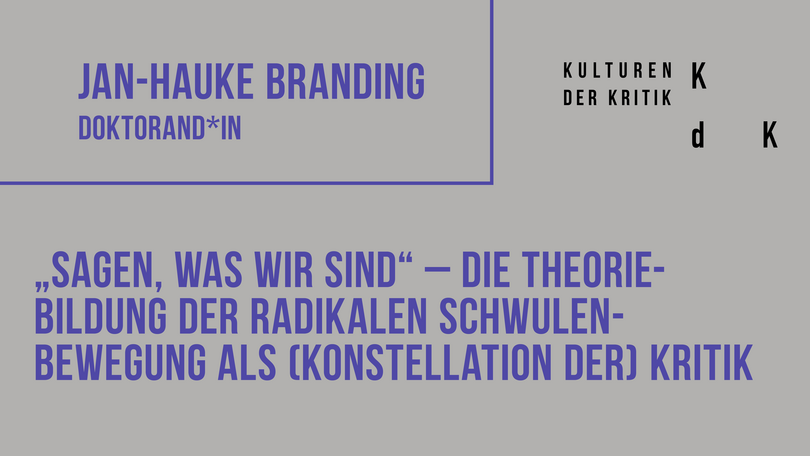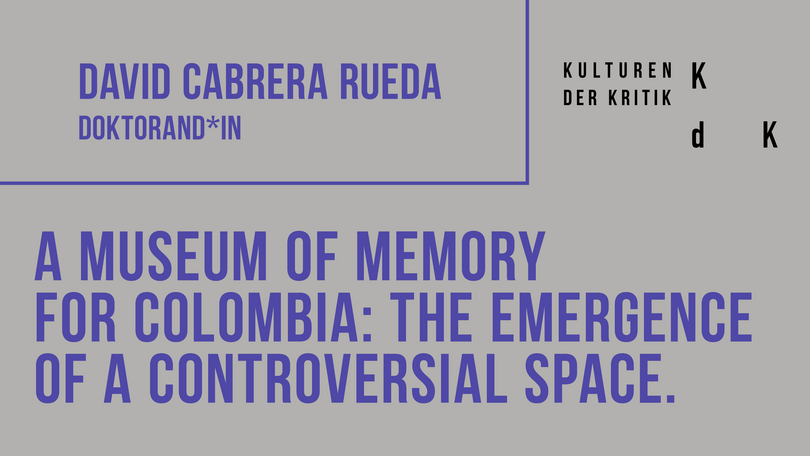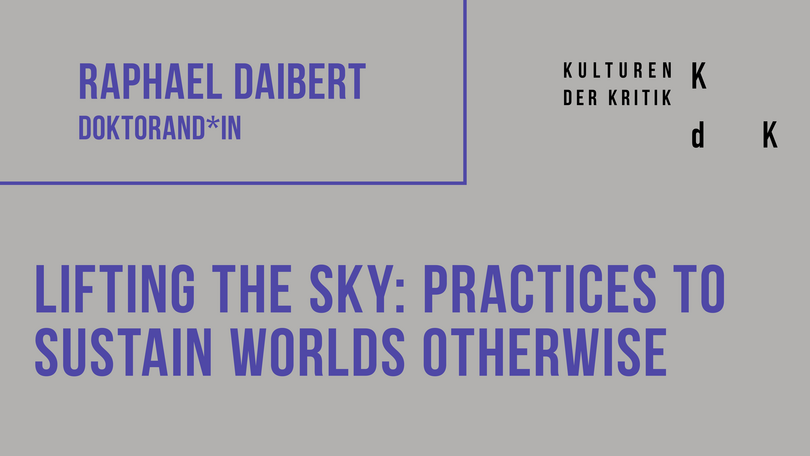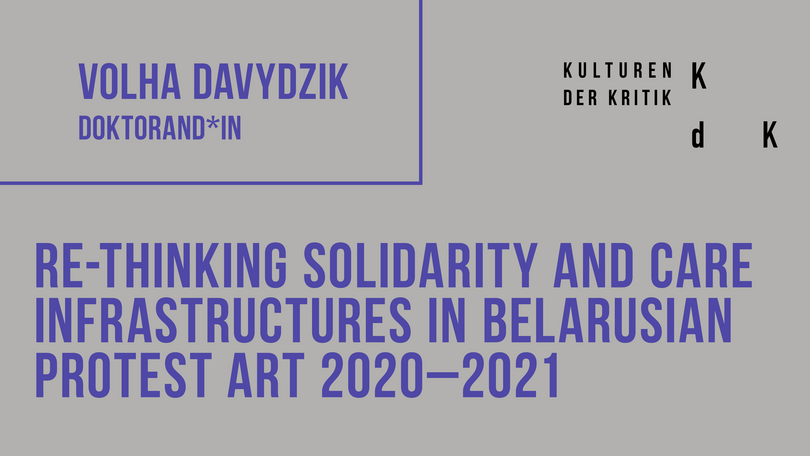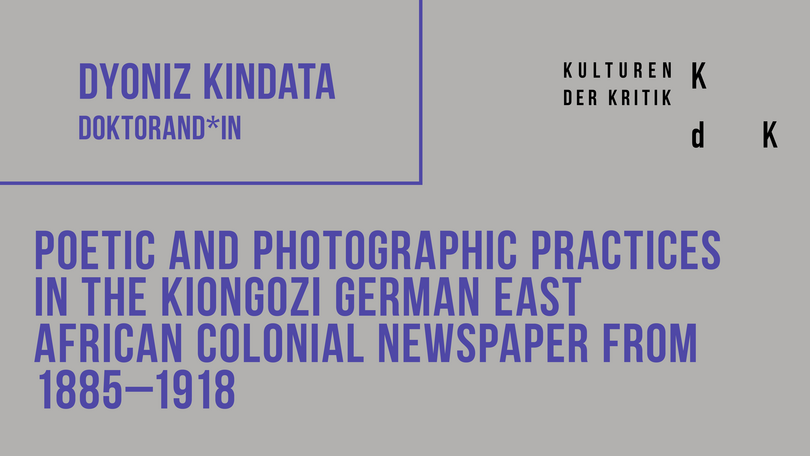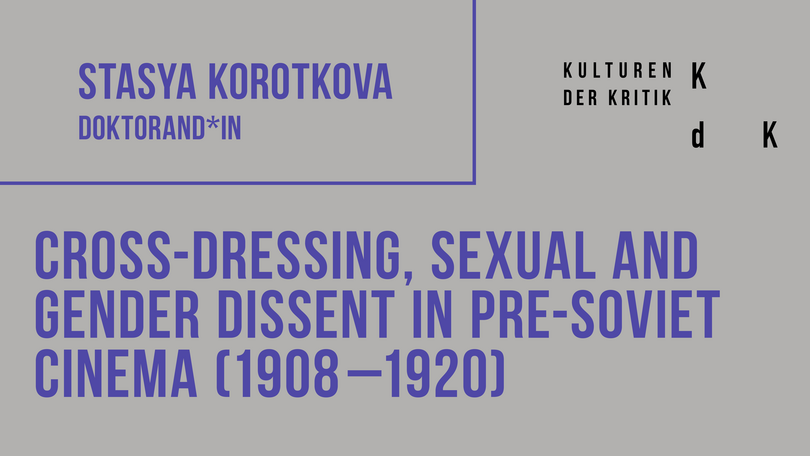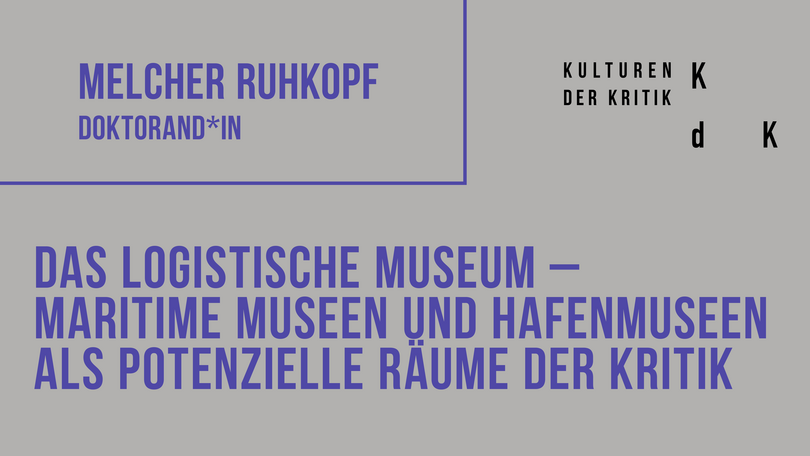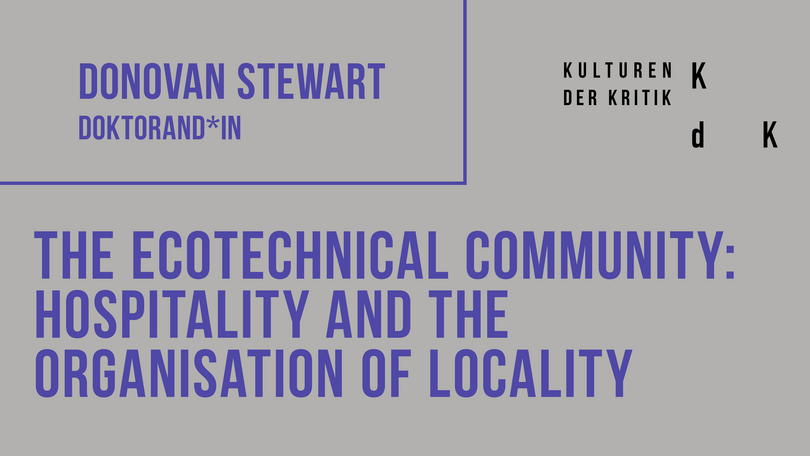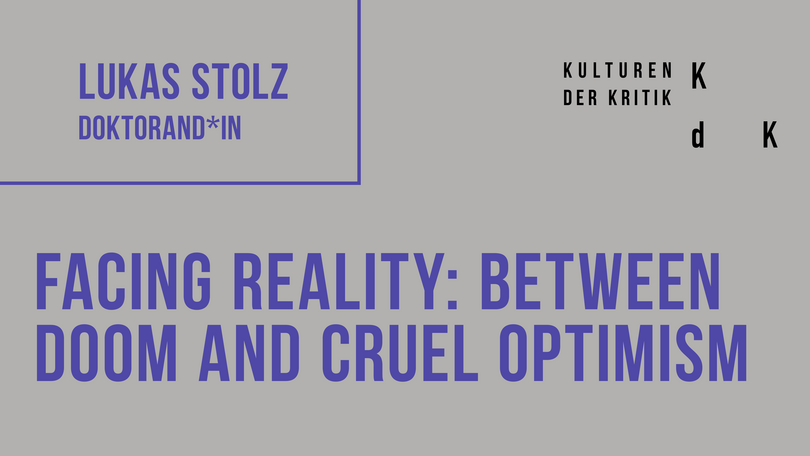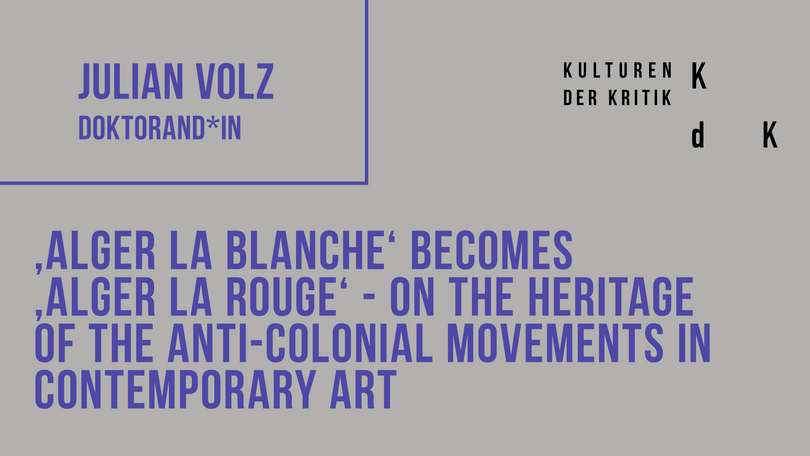Identity as Deportability: On ‘Identitatsklärung’ as a Contested Practice of Control within the German-European Deportation Regime
Identifying personal documents and information, or the lack thereof, are often of central importance in conflicts surrounding forced mobility. The proposed dissertation project centers around the role of 'identity clarification' (Identitätsklärung) in the context of the German deportation regime, exploring issues of governmentality and resistance. Relying on both multi-sited ethnography and a genealogical approach, I plan to trace the term's increasing centrality within the German Residence Act and to consider different technologies of control through which the pressure to 'clarify' one's identity is enacted. Moving away from a state-centered understanding of control to also consider, for example, economies of deportation, the everyday practices of street-level bureaucrats, or humanitarian discourses, the project examines how a specific notion of identity is generated in each of these settings. A few initial objects of consideration include everyday bureaucratic practices at German immigration offices, shifting norms within the German Residence Act, European funding for civil status databases in West Africa, and the document verification procedures of German embassies. While at once exploring the implications of these practices for our understanding of governmentality, I also look for the fissures and incompleteness of facades of control and think about what space might remain for lines of flight. Peripherally, the project also asks how research might be reimagined as a practice of producing knowledge with practical relevance for social movements.
My project examines the formation of (critical) theory within the radical gay movement of the 1970s in (West-)Germany as a specific constellation of critique. Aside from the theoretical ideas, theory-building processes are central to my project. In their efforts of analyzing and critiquing the connection between sexuality and domination, an essential characteristic of the radical gay movement becomes apparent: the reciprocal relationship between experience and critique. The hegemonic production of knowledge was countered by subjective theorizing based in one's own experiences. As a historically situated, critical practice, the interventions and debates of the radical gay movement aimed at giving texture to the relations between society, gender, sexuality and emancipation – therefore, they are as much a contribution to the theorization of sexuality as they are a mode of critique.
In addition to its historical significance, this critical practice offers a remarkable original contribution as well as a surprising timeliness that, especially in its unredeemed moments, point to a transformative potential in the present that may also inform contemporary (queer) theory and practice.
My project draws on Walter Benjamin's and Hannah Arendt's conceptualizations of history as well as their contemporary feminist receptions to develop an understanding of non-linear and multidirectional history opening up the possibility of simultaneously determining the theoretical ideas of the gay movement as documents grounded in their times and as presently effective.
My dissertation project explores the physical dimension of the Colombian Memory Museum (urban, architectural and museographic scale).The museum is a symbolic reparation instrument framed within a transitional justice model created while the peace agreement between the national government and the FARC-EP guerrilla was in progress. The project analyses the timing and the reasons behind constructing the museum in Bogotá. It asks whether these decisions are the trigger that defines both the material presence of the museum in the city and its exhibition content.
In April 2015, the National government and the Society of Colombian Architects launched a competition to design the building for Colombia's Museum of Memory in Bogotá, located within the Peace and Memory Axis on Jorge Eliecer Gaitán Avenue. This urban initiative aims to transform the avenue dynamics, turning it into an axis of Collective Memory. Therefore, the Museum cannot be understood as an isolated project but as a link that, together with other cultural institutions, narrates the official memory of Colombia.
In April 2018, in the last months of Santos’ government (2010-2018), the museological script and curatorial content of the Museum were tested before its construction. The exhibition Voces para transformar a Colombia (Voices to Transform Colombia) is regarded as an itinerant laboratory, fostering the creation of networks connecting communities and memory sites in various territories with the Museum in Bogotá.
In August 2018, Iván Duque (2018-2022) assumed the presidency of Colombia. Duque achieved this position through a campaign opposing the previous government's peace policy. In February 2019, Duque placed in charge of the Museum a historian who challenges the existence of an armed conflict in Colombia and censored the Voces exhibition at Museo la Tertulia in Cali, held in October 2019. As a result, the Colombian transitional justice mechanism had to protect and prohibit any modification to the exhibition.
Following the historian Renán Silva, my projects understands the moment Colombia is going through as a “dispute over the interpretations of the past”. To map this dispute I study the unfinished Museum of Memory that not only represents these interpretations but is also being constructed in a different and conjunctural context.
How do we become sky lifters? According to the indigenous Yanomami cosmology, two worlds before this world have ended with the falling of the sky. I argue that this world, on the brink of environmental devastation, needs to learn from practices and practitioners that have long dealt with nature in a form that “The Understanding” (Ferreira da Silva 2016) continuously tries to destroy. In conversation with decolonial theorists from the Global South and the “doings” (Muñoz 2009) of artists from Brazil, my interest lies in revealing practices that act beyond the binaries of human and nature and form altogether an “ecology of practices.” (Stengers 2005) The premise of my investigation departs from the indigenous cosmology mentioned with the intention to look for examples that would serve as sky lifters, e.g. artistic practices that enact other ways of being in and with nature, together with my own practice as a research-based artist and curator.
One significant example of an artist and activist that emphasizes my argument is Abdias Nascimento (1914-2011). His political, performative and artistic practices from the 1940's to the 1980's not only set the ground to deviant non-white artists to flourish in the cultural scene but was and is essential to a process of emancipation in the building of different realities.
By invoking more-than-human perspectives and indigenous cosmovisions, my goal is that these anti-hegemonic artistic doings would not only bring to the surface the constant fight against racial and gender subjugation of people of color and indigenous peoples in Latin America, but share possibilities of moving towards a “world of many worlds” – as defended by the Zapatistas – having art practice as the central medium of being and fabulating about worlds otherwise.
Object of research: Political art practices and their role in shaping the solidarity and networks of care in non-democratic societies.
Research question: The following research proposal aims to outline and explore two blocks of interconnected questions. During the ongoing social and political crises, it became apparent that the forms of vulnerability, codependency, on the one hand, and oppression, control, on the other, reach the deepest layers of existence, affecting the level of intimate settings, turning precarity into a diffuse, characteristic: individuals experience their vulnerability in different statuses and social situations. The question arises whether there is a limit for precarity, whether there is something beyond the work of inclusion-exclusion machines, what is the basis for such a mode of existence and how to form new ways of solidarity and connectivity. In which way is positive vulnerability possible as the basis of solidarity, and how should care infrastructures be built?
We can see how contemporary political art becomes an instrument of social transformations and serves the growth of communities and promotes the idea of solidarity based on care as a structural practice, as an arrangement of life. The artistic gesture, turned into political action, can be an expression of hope for changes, an instrument of political imagination. How did an artistic practice have such a strong effect on societies? Where did this point of intersection between artistic practice and political action arise? How does this affect our perception of the political, art, and action in modern times?
Caring infrastructures and solidarity networks can be created even inside oppressed societies. In a situation of extreme violence, the participants can use the potential of the peaceful, soft tactics in the protests and continue to provide assistance and support, recognizing at the same time the strength and weaknesses of each other. In political art, tools and visual expression are formed that contribute to splitting up monolithic narratives. It creates an opportunity to overcome the internal embeddedness and inviolability of hierarchies; includes many different points of view, perceptions, interpretations, visions and affects. Working with the reality of an affect, modern political art makes it possible for the individuals and groups to realize their involvement in the moment of action, create an independent agenda, and form horizontal network connections outside hierarchical structures.
In my thesis I aim at deducing crisis as a necessary consequence resulting from the dialectical value-form of modernity, manifesting in the tautological self-production of (i) labor and (ii) money.
Following accounts of value-form theory, the potential of the valorization of value – i.e. of realizing abstract value from concrete labor – continues to come to a halt after a critical threshold has been surpassed. My aim is to examine if linking the concept of the self-sublating value-form to a notion of modern ‘enlightenment’ as the “entrenchment of the spirit in matter” (Panajotis Kondylis) and the driving role of the concept of debt can help to understand the compulsory progressing abstraction from constitutive-yet-increasingly-irrelevant concrete labor as a consequence of the process of rationalization. To account for the dynamic of the value-form and its ‘progressive’ entrenchment of the abstract (~ value) within the concrete (~ labor) both are bracketed within Reinhart Koselleck’s hypothesis of accelerating history.
First, I will therefore deduct the historical trajectory of rationalization from Koselleck’s account of acceleration which itself epistemologically rests upon the form of rational logic and therefore is conceptually dependent on that which it entails. Secondly, I want to show how this framework of European rationalization brings with it the debt-driven dynamic of the “entrenchment of the spirit in matter” as the conceptual tradition of what in capitalism came to be the modern value-form. Following this course, I lastly aim to delineate two phenomena of crisis as necessary consequences of the dialectic of the value-form: The aporias of (i) the ‘autopoiesis of labor’ and (ii) the self-production of money. I thus want to demonstrate the increasing developments of physical fitness and financialization since the 1970s in capitalist centers to be the two sides of the coin of increasing irrationality: The divestment of (concrete) labor ultimately expresses itself as the application of labor power onto itself as the (relative) last ‘commodity’ left to produce and has the ghostly generation of valueless money as its backside.
The aim of my project is to investigate how the narrative of 'primitive communism' developed at the intersection of politics and ethnography in the 19th and early 20th centuries. I focus on the writings of Lewis Henry Morgan, Friedrich Engels, Rosa Luxemburg, and Pjotr Kropotkin, among others, who contributed significantly to the consolidation and development of the narrative. These texts build on much older themes, such as the idea of a peaceful ‘state of nature’ or a ‘golden age,’ that the authors use as examples to criticize their own societies. Since the expansion of the ‘primitive communism’ narrative is not linear, I explore a variety of different genres, including texts from the fields of political economy, economic history, political theory, moral philosophy, ethnology as well as fiction.
In the second half of the 19th century, Darwin's theory of evolution and the differentiation of ethnology as a discipline – coupled with Marx's historical materialism and communist movements – provided crucial historical conditions that modified the narrative of ‘primitive communism’. Writers simultaneously located the abstract idea of a 'state of nature' in the distant, prehistoric past as well as in the ethnological present. Specific forms of coexistence were decidedly named 'communist' and thus embedded in a concrete political and moral-philosophical context of interpretation. The ideas of evolutionism as well as an evolutionist ethnography allowed for a diachronic search for the biological foundations of human coexistence in the "animal and human world" (Kropotkin), thus providing a basis for modern sociobiology.
My work contributes to the decolonization of bodies of knowledge, as well as to scholarship on the development of knowledge about prehistory and early history, to pursue the thesis that history is always structured by political aesthetics.
The newspaper was a site of negotiation of socially shared knowledge in the emerging culturally heterogeneous colonial society in the years 1885-1918 in German East Africa (which included Tanganyika, present-day Tanzania, Burundi, and Rwanda). In this process, newspapers are central contact zones and emerging archives in which the migration of knowledge from the European to the African context and vice versa, its entanglement, and the gradual emergence of knowledge themes can be concretely traced. The starting hypothesis is that colonial newspapers, as the first African mass media are the crucial sites of negotiation for the knowledge shared in colonial society, its mode of transmission, and its reception. By combining multimodal newspaper analysis such as close reading, narratology, and imagology, the project aims to investigate, on the one hand, the manifestation of the thematic concept of citizenship and its forms in terms of critical constellations of power as represented in textual codes; for example, aesthetic codes such as poetry and different genres in the selected newspapers. By fundamentally asking the questions, for example: what kind of genre did people experiment with to contribute to the notion of citizenship as socially shared knowledge? How was it negotiated, considering that citizenship was the subject of dialogue from above and below and shaped by both African and colonial powers, who wrote it ("discourse communities" Knoblauch 2003), who the audience (reading public) was and how was received. On the other hand, the project aims to critically examine the role of visual representations such as images and illustrations in the colonial web of narratives, realities, and concepts of citizenship. Furthermore, this study of colonial newspapers encourages us to critically rethink some of our assumptions about text, print, and writing in colonial Africa.
Reference
Knoblauch, Hubert, 2003. „Diskurs, Kommunikation und Wissenssoziologie.“ In: Reiner Keller et al. (Hg), Handbuch sozialwissenschaftliche Diskursanalyse. Opladen: Leske/Budrich, 209-226.
This project explores numerous examples of characters cross-dressing and showing signs of non-heterosexual desire in the films produced in the Russian Empire within the period from 1909 to 1917 as well as in the films produced by entrepreneurs right after the revolution but before the emergence of the Soviet film industry. Around 85% of the films of the Russian Empire are considered lost, but it is still possible to reconstruct some of their storylines on the basis of press reviews, technical summaries, marketing materials, memoirs and censorship committee protocols. I will use these available early sources to analyze how the depictions of what we now could define as queer subtexts and gender play were perceived by the viewers of the 1910s. Understanding what these images were communicating to the audience back then is essential since cinema was not only reflecting the norms and expectations towards gender expression of its time but also actively forming them. I plan to apply a cultural historical approach and place these performances in a broader context of social debates on gender and sexuality in early 20th century Russia and specifically trace some of the public discussions on the topic of cross-dressing in Russian theatrical circles. This project identifies three major groups of performances that can be tentatively classified as 1) cross-gender casting, 2) cross-dressing as a part of the plot, and 3) representation of sexual and gender dissent. The last chapter will also include analysis of film adaptations of literary works that once contained non-heterosexual characters, — figures who might have been lost while the texts were adapted for the screen.
This PhD project explores the museological potential of a critical understanding of logistics, stemming from critical geography, Marxist political economy, postcolonial studies, media studies, and cultural theory. Logistics is hence understood as an operative logic that organizes flows of commodities and capital, but also of bodies and subjectivities, on multiple spatial scales according to a paradigm of circulation and connectivity, often proceeding with extreme force and violence.
Through ethnographic explorations in various museums, the project asks to what extent the museal narration of global commodity flows corresponds to such an understanding of logistics or can be criticized from such angle. On the other hand, it asks about the logistical dimension of museum practices such as exhibiting, collecting, and designing themselves, since these also follow certain logics of circulation and distribution – of bodies and objects in space, but also of discourses, affects, and experiences. Hence, the PhD project makes productive the field of tension between the "musealization of logistics" on the one hand and the "logistics of the museum" on the other.
The methodological approach is described best as ethnographically informed theory. The empirical material, collected through qualitative methods of field research and museum analysis, is confronted with theoretical concepts from critical logistics studies and museology, aiming towards a museological conception of logistics, resp. a logistical museology. By linking discourses of logistical theory and museum studies, the project contributes to the critical analysis of globalized capitalism under a logistical paradigm. It expands the focus of critical logistics studies beyond its economic context of origin and tests its application to aesthetic and discursive phenomena of the museum. At the same time, this strengthens a museological angle of analysis that shifts the focus from the examination of singular exhibitions or displays toward their relational modes of operation and functional logics.
This dissertation project centers on the recovery [Wi(e)der-Herstellung] of (im)material cultural heritage by the Tairona’s descendants—the Kággaba/Kogi, Ika/Arhuaco, Wiwa/Malayo, and Kankuamo/Atanque of the Sierra Nevada de Santa Marta, Colombia.
The aim of this research is to map out a critique of the modern/colonial mode of thought and its attendant practices, thus interrogating prevailing concepts of identity, culture, property, and heritage while drawing on and legitimating alternative epistemological systems—such as those of the descendants of the Tairona. Starting from dialogue with the Kággaba of the Sierra Nevada de Santa Marta, selected museums, and other experts within and beyond Colombia, knowledge contexts and a range of methods are linked together in a multi-perspectival approach.
The foundational hypothesis of this project is that conservational practices operate within the museum and exhibition contexts which can be traced back to the epistemology of modernity. These are contradicted by the modes of thought and action held among the descendants of the Tairona, whose notions are assumed to diverge fundamentally from the modern museum’s concept of the object. On this basis, the project will discuss a notion of objects as living entities; it is from this notion that the titular praxes of the transitory will be derived, as a proposed counter to praxes of the conservational.
Key to the project will be creating an inventory of the (im)material cultural heritage’s continued presence in museum collections worldwide; it will be on this basis that the provenances and meanings of the ‘objects’—and the forms and consequences of their translocations—are discussed. The aim is here to research the conditions that must be established for the cultural heritage’s future reconnection with and possible restitution to the descendants of the Tairona and, on this basis, to compile guidelines for similar processes.
This project is designed as an epistemic investigation of reconnection processes at the institutional, international, intercultural, legal, and ethical levels, considered in all their entanglements and incompatibilities. It will not only produce new conditions in which ethical relations can flourish; the aim is furthermore to identify transcultural and transdisciplinary perspectives and to contribute toward an academic and museum practice able to make critical interventions within a global, decolonializing context.
My project asks: How must the organisation of political place be rethought in the wake of contemporary theories of ecological and technical existence? I first analyse two hegemonic understandings of the organisation of political place that continue to orientate political theory today––one concerning ‘locality’ (Heidegger 1982, Stiegler 2018), the other, ‘community’ (Blanchot 1988, Nancy 1991). I then introduce contemporary ecotechnical thought (Hörl 2020, Lindberg 2022) and argue that its insights demand for these understandings of political place to be reconsidered. Finally, I offer a theoretical foundation for ecotechnical community and demonstrate how artistic experimentation has, and will continue to be, central to actualise this thinking.
The need to provide an ecotechnical critique of the organisation of political place comes as the concept of organisation itself undergoes a transformation. Rather than being solely an activity of human life, organisation is increasingly understood to be an ontologically ambivalent operation that gives form to beings in ways made possible by specific eco-techno-historical conditions. Such organisation demands for us to acknowledge an organisational a priori (Beyes, 2021) at the basis of existence, experience, and any possible critique. Furthermore, this return to the problem of the (re)organisation of political place follows preliminary moments in the deconstruction of the oppositions of polis-physis, bios–zoē, society-nature, that intensifies today, not only due to recent appropriations of Derrida’s thinking of archi-writing as the general history of life (Derrida 1982, Lynes 2018, Vitale 2019), but most forcefully because of the material immanent critiques that surround us today, the different forms of revenge from the ‘things themselves’ (Latour 2017, Haraway 2017), that necessitate an aggressive reformulation of the basic concepts of philosophy and politics––a necessity that highlights the (re)organisation of political place as one of the foremost objects for contemporary critique.
The starting point of my project is the difficulty to imagine political alternatives to the status quo in times of climate catastrophe and related feelings of political despair in western industrialised societies. While I’m asking how radical social transformation can be imagined under these circumstances, I’ m sceptical towards demands of inventing the future and the hegemonic narrative of sustainable development as they are informed by Eurocentric notions of history and thus perpetuate colonial imaginaries. Looking at the recent wave of climate protests that mobilised around a growing concern for the future with the post- and decolonial critique of progress and historicism in the back of my mind, I’m wondering: Are there ways of imagining liberation that don’t depend on the certainty of a better future? Can we think about progressive politics beyond the master narrative of historical progress? Could a pluralised understanding of time and history help us out of an imaginative impasse that increasingly structures public debates: the binary of fatalistic doomism on one hand and of cruel eco-optimism on the other? As multiple interlinked crises continue to escalate, I believe that these questions are relevant not only for climate activists but that imaginative resilience – the capacity to imagine the possibility of radical transformation despite uncertainty and precarious futures – is a crucial aspect yet often overlooked in critical theory and debates about climate change. My hypothesis is that the hegemonic and progress-oriented western environmental imagination can learn from a dialogue with traditions ‘at the margins’ in this regard – e.g. indigenous cosmologies, queer theory and the Black radical tradition – especially when it comes to the role of non-linear and non-teleological temporalities for alternative concepts of liberation.
My project will research contemporary artistic practices of ten artists (including Bouchra Khalili, Massinisa Selmani, Zineb Sedira or Yasmina Reggad) that engage with the culture and politics of Algeria in the first decade (1962–1972) of its arduously won independence from French colonialism. I will particularly focus on works which draw on the artistic and creative processes of film, radio, and icon production (as with Frantz Fanon and Djamila Bouhired), and spatial production in a context of social upheaval. In the forms of installation and video, these works translate these historical practices into the Western institution of art (Peter Bürger) and thus situate themselves within an entangled history that does not only highlight continued enmeshments of the former colonial power and colony, but also explicitly foregrounds the manifold interrelated worlds of the Global South, of which Algiers for some years was one of the key hubs. From this follows a hybridity that—per my thesis—offers a valuable site for reflection and critique within the institution of art.
Through their encounters with the creative testimonies of a revolutionary epoch, these artists help renegotiate the relationship of art and society, especially by highlighting the transformation of the function of art that takes place amidst social upheaval. My focus here will be the critical effects enacted by these spatial and temporal displacements and translations. This theoretical approach aims to present a certain symmetry between a radical kind of aesthetic theory (Adorno) and postcolonial approaches to the hybridization of the subject of investigation.

